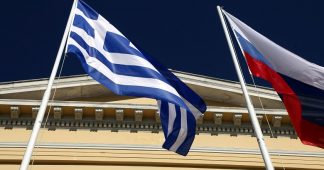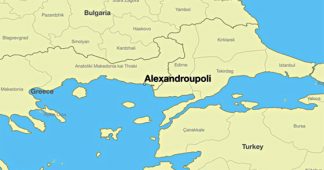Volodimir Zelensky, the Ukrainian President was invited by the (extremely pro-American and pro-NATO) governemnt in Athens to speak to the Greek Parliament on April 7th.
He delivered a vitriolic speech, full of accusations, against “nazi Russia”. But he did something more. Upon finishing his speech he gave the floor to a member of the neo-Nazi Azov batallion to adress the Greek parliament.
And he did that in the capital of a country which is one which suffered more from Nazi barbarism in Europe.
Greeks, although condemning the Russian intervention in Ukraine, are not at all enthusiastic about the anti-Russian hysteria, the measures taken against Russia, including Russian citizens and Russian civilization and the neo-McCarthyism dominating Greek political life and media, as in all western world, and threatening whatever remains of elementary democratic rights in the West. They remember also quite well that the United States have imposed a dictatorship in their own country back in 1967. They remember also very well that NATO-member Turkey, acting upon Henry Kissinger’s encouragement, invaded Cyprus in 1974 and keeps always there a huge occupation force. Greeks have not also forgotten the bombings and invasions of Yugoslavia, of Iraq or of Libya. They are against the Russian military intervention, but they also agree that Moscow has legitimate and important security concerns.
Asked in a poll published by the Greek newspaper Demokratia of 6th of April, 2.1% of the population is attributing responsibility for the present conflict to Ukraine, 27.8% to Russia, 31.1% to western powers and 37,1% to all of them. 71,6% of the population is against the decision of the government to provide armaments to Ukraine. And 55% of Greeks were against the decision to invite Zelensky to speak to the Greek Parliament.
But when Greeks saw a Neonazi “Azov militant”, a gangster-like figure speaking to their parliament, indignation has exploded in the social media.
All the opposition parties condemned this appearance and accused the government. Even the ex-PM from the governing party of New Democracy Antonis Samaras spoke of a “serious error”.
If the aim of Zelensky (and his American advisors, who most probably arrange his “appearances”) was to attract some sympathy for his country and for himself, or to legitimize the infamous Azov Batallion, he achieved the exact opposite. His presence has resonated immediately to Cyprus, where the biggest opposition party, the leftist AKEL decided to abstain from the speech to the Cypriot parliament he delivered after his Greek speech.
Some well informed observers believe that Geoffrey Pyatt, ex-Ambassador of the United States to Kiev (during the 2014 coup d’état) and now to Athens, a very fanatic person, has played probably a role with his advice to the fiasco of the Zelensky speech, but there is no way to prove or disprove such an allegation.
On the contrary, it is possible that April 7th will remain in history as the beginning of a new deep crisis in Greece. It is quite obvious that the present political elite of the country is in direct contradiction to the wishes of the people in all important, critical problems, including the dire economic and social situation which will deteriorate further as a result of sanctions applied against Russia.
Dimitris Konstantakopoulos
Athens











